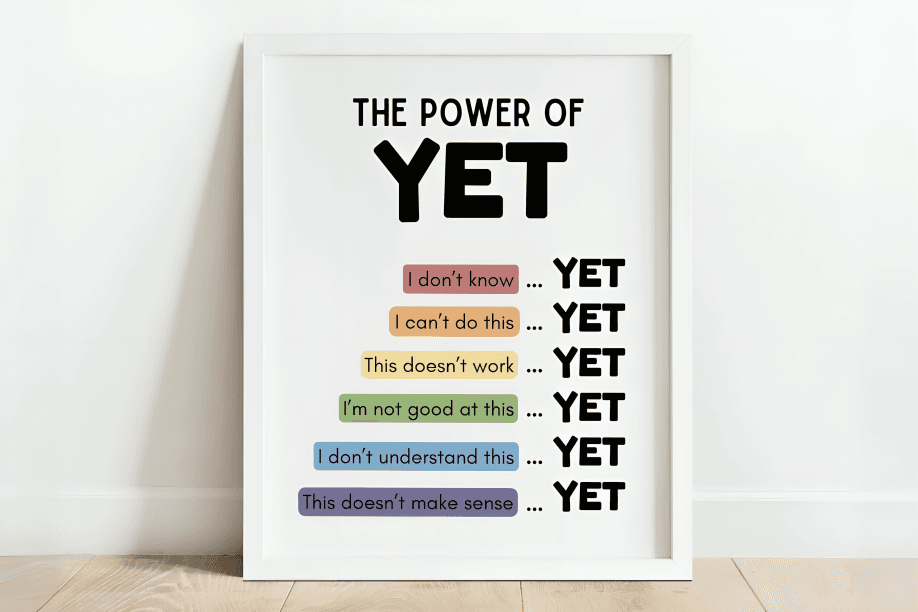
“
A growth mindset for success is the key to unlocking your true potential. It helps you see challenges as opportunities, bounce back from setbacks, and continue learning and growing. With this mindset, you’ll not only reach your goals but exceed them.1
1
”
Psychologist Carol Dweck, known for her work on the growth mindset, believes that people who embrace challenges, learn from criticism, and persist through setbacks are more likely to achieve success over time. 1
Embracing challenges is vital for fostering a growth mindset, as it helps to overcome the fear of failure and pushes individuals to improve their skills and problem-solving abilities with every attempt. 2
Setting realistic and achievable goals plays a key role in building a growth mindset. Breaking down larger objectives into smaller steps allows for measurable progress, helping to keep motivation high throughout the process. 3

Adopting a “yet” mentality is a powerful tool in developing a growth mindset. Rather than saying, “I can’t do this,” replace it with “I can’t do this yet,” signifying progress is possible.
Emphasizing the process over the result helps shift the focus from achieving an outcome to enjoying the journey of learning and developing new skills, leading to long-term growth and satisfaction. 4
Consistently practicing mindfulness can improve focus, reduce stress, and help individuals maintain a growth mindset. Mindfulness encourages individuals to stay present, fostering better learning and challenging. 5
Cultivating curiosity leads to personal growth, as individuals with a growth mindset are naturally curious about learning new things and challenging themselves with new experiences and opportunities. 6
Embracing constructive feedback from others helps refine skills and enhance learning. Accepting criticism as a tool for improvement rather than as a personal attack fosters resilience and growth in all areas. 7
Being open to change is an essential characteristic of a growth mindset. Those who are willing to adapt to new circumstances and learn from them are better equipped to navigate challenges and reach their goals. 8
Developing resilience is crucial to sustaining a growth mindset. By learning to bounce back from setbacks and persist in the face of difficulties, individuals can build the mental strength needed for continuous success. 9

Success comes from the ability to learn from mistakes. Those with a growth mindset don’t see failure as a setback but as an opportunity to grow and improve for future endeavors.
Practicing patience with oneself is vital when developing a growth mindset. Understanding that success takes time and effort helps reduce the pressure to achieve perfection, continuous improvement. 10
Celebrating small victories encourages individuals to recognize and appreciate their progress, reinforcing the importance of perseverance for tackling future challenges with a growth-focused approach. 11
Adopting a positive self-talk routine helps shape your internal narrative. Reminding yourself of past successes and affirming your capability to grow fosters a mindset of resilience and confidence in your ability to succeed. 12
Recognizing that effort is more important than innate talent helps shift focus towards continuous improvement. Those with a growth mindset understand that success is not determined by genetics but by hard work. 13
Consistently practicing gratitude can shift the focus from perceived failures to positive aspects of life. A mindset of gratitude helps individuals stay motivated and resilient in the face of challenges while maintaining a positive outlook. 14

Breaking down large tasks into manageable portions makes them less daunting, helping to develop the necessary focus and drive to succeed. Achieving small wins along the way builds momentum and motivation.
Understanding that setbacks are a natural part of the growth process helps to reduce the fear of failure. Accepting mistakes as learning opportunities ensures that obstacles do not deter long-term progress. 15
Research suggests that stress management is crucial in maintaining a growth mindset. Finding healthy ways to cope with stress, such as exercise or deep breathing, can improve focus. 16
Philosopher Aristotle once said, “We are what we repeatedly do.” By fostering a mindset of continuous improvement, individuals align their actions with success, reinforcing the idea that growth is achieved through effort and practice. 17


